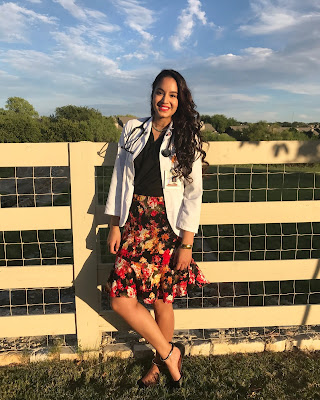Meet Diandra! A third year PA student from San Antonio, TX. She's a former real estate broker and D1 athlete.
About DiandraBefore PA school, I graduated with a bachelors of business in marketing and went on to get my MBA. After graduating, I landed a job as a commercial real estate broker in Miami, and lived on South Beach for a year and a half (And it was AMAZING). However, I realized that I really wasn’t happy in that profession and I felt like I had more to contribute to society. So, I moved back home to do some soul searching and figure out what I really wanted to do with my life. Growing up I always dreamed of becoming a doctor, but I was forced to change my major from biology to business due to a demanding athletic schedule (I played both D1 basketball and volleyball) and making it to all the science labs was nearly impossible because it seemed like I was always on the road for games. I decided to continue on the business route and and went to grad school for my MBA vs going to med school. Fast forward a few years, and I was right back to square one wishing I had gone to med school. Once home, I enrolled myself in school and began taking all the prerequisite science classes for med school and I started working as an ER scribe to get healthcare experience.
Why PA?
It wasn’t until I started working as an ER scribe that I was exposed to the PA profession. Once I learned about PA’s, it was really the flexibility in changing specialties that sold me (although less school and less debt was a major plus). I was so intrigued with the idea that I could basically be doing something different (like switching from emergency medicine to derm or orthopedic surgery) for the rest of my life that sealed the deal.
Do you have any study tips for PA students?
For me, it wasn’t the fact that the material was so difficult to comprehend, but more so the amount of material that was being covered in such a short amount of time. The best advice I can give is to prioritize your time, and take naps (sometimes an hour and a half nap can really give you the boost you need).
During clinical year, I recommend STEP-UP to medicine as a great study reference for end of rotation exams. The book is thorough, but doesn’t go into the weeds and is written in a fantastic easy to follow format. STEP-UP to medicine also has books for different specialties such as STEP-UP to OBGYN, Surgery, Emergency Medicine, etc.
How do you deal with stress?
During PA school, everyone will be stressed out lol. I usually try to keep my stress levels at bay by making a plan for my week and trying my best to stick to it. Sometimes having 4 exams in one week can be very overwhelming so I usually try to make a to-do list and complete each task one at a time to follow my schedule. It’s amazing how much you can accomplish by taking it one step at a time without getting distracted by trying to do a million things at once. Napping is also the key to success for me, and eating a really good meal on heavy study days.
Most challenging class and why?
Initially, the most challenging class for me was pharmacology. It was definitely the class that I spent the most time studying for because there are so many different things you need to learn about each drug (MOA, drug class, side effects, contraindications, etc). It took me a while to get the hang of how I needed to study to be successful on the exams, but the more time I spent on it, the easier it became to me. Study tip: Make charts especially for antibiotic classes. Making these saved my life on exams and it was easier for me to distinguish between the similarities and differences for antibiotics that can be used to treat the same kinds of infections.
What's a good resource that you've found helpful so far?
STEP-UP to Medicine
Pance Prep Pearls
Certification and Re-certification for Physician Assistants
Best experience in PA school so far?
The best experience that I’ve had in PA school so far has been during clinical rotations. It is incredible when you get to see everything that you’re learning about in textbooks. It’s like a little lightbulb goes off in your head and you suddenly understand the concepts and pathophys and everything starts coming together. It’s also the best feeling when patients thank you for taking the time to listen to them, for caring, and for being a part of their medical care in general. Makes all the studying worth it.
Advice for pre-PA students
Don’t worry too much if your GPA isn’t as competitive as you’d like it to be. Become a stronger applicant by volunteering in the community, getting as many PA shadow hours as you can, and by researching the PA profession. The more well-rounded you are, the better applicant you will be! Good luck to all and please fell free to reach out to me about any questions you may have about switching careers or becoming a PA!
For more on Diandra, you can find her on IG: @diandraalyssa

No comments :
Post a Comment